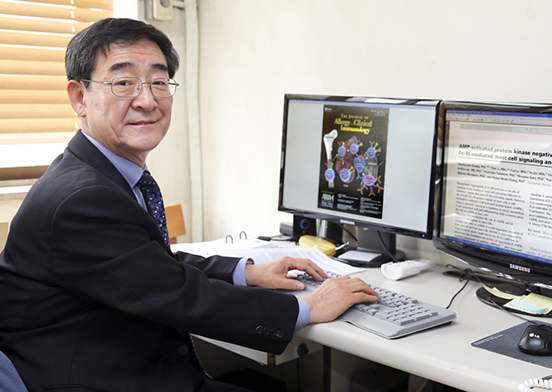College of Pharmacy Professor Chang Hyun-wook suggests possibility of development of new drugs for metabolism and allergy diseases
Published in online version of <Allergy and Clinical Immunology>, the world's top journal in allergies
[June 24, 2014]
College of Pharmacy Professor Chang Hyun-wook (62) accelerated the possibility of developing a new drug that can simultaneously treat metabolism related diseases and allergy related diseases for the first time in the world.
In 2013, Professor Chang scientifically proved through that by artificially activating 'AMPK (AMP-activated protein kinase), a signal protein for maintaining body energy homeostasis, it is possible to simultaneously treat allergy diseases as well as metabolism diseases simultaneously through experimentations on rats. Professor Chang's research was the first in the world to reveal that AMPK activation can treat metabolism diseases such as diabetes, obesity and fatty liver, while also simultaneously suppressing allergic and inflammation reactions.
Through follow-up research Professor Chang confirmed that AMPK and the signal controlling phosphorylation enzyme ERK1 and 2 (extracellular signal-regulated kinase 1/2) restricted mutual activation. Through fatty cells, which are the main cells that cause allergies, and animal tests, Professor Chang became the first in the world to reveal that ERK1 and 2 and AMPK cancels out each other's effects to control generation of allergy and inflammation causing substances. When fatty cells are activated, ERK 1 and 2 moves the AMPK in the cytoplasm to the nucleus so that it cannot function, to promote generation of mediums that cause allergies and inflammation. He discovered that on the flip side, when ERK 1 and 2 are suppressed, the AMPK comes out of the nucleus to the cytoplasm to suppress allergy causing substances.
Again after 2013, the research results were published in the world's top SCI journal in the allergy field <Journal of Allergy and Clinical Immunology (JACI, Impact Factor 12.05)> published by the American Academy of Asthma and Immunology's June 17 online version.
This research was very significant in that it provided a cornerstone for developing new allergy treatment. Clinical allergy treatments used currently are normally chemicals that suppress generation such as histamine receptor antagonist, histamine allergy suppressing drugs, lipid medium and inflammatory cytokine. These drugs can relieve allergy symptoms, but is accompanied with various side effects, and therefore, discovery of new control paths have been necessary in order to develop more fundamental allergy treatment.
Professor Chang said, "The achievement of this study is that it was confirmed that when AMPK is artificially activated in fatty cells, activation of ERK 1 and 2 can be suppressed." He added, "Because artificial activation of AMPK can be connected to type 2 diabetes and obesity treatment, depending on the research results, it can be used as important basic data needed for developing new drugs that can simultaneously treat metabolism-related diseases and allergy diseases."
Meanwhile, this study was carried out with funding by the senior researcher support program (core research) pursued by the Ministry of Science, ICT and Future Planning and the National Research Foundation.










